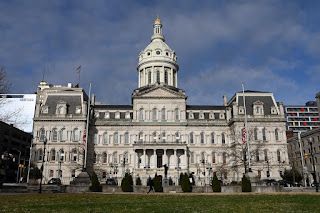Baltimore’s budget for private security has ballooned. Officials will weigh spending $4.5 million more

Baltimore MD April 15 2021 The city of Baltimore’s private security costs have ballooned over the last five years and are set to increase by another $4.5 million this week if approved of the Board of Estimates.
Since 2016, Baltimore has contracted with Metropolitan Protective Services for armed private security. The contract approved in March of that year was worth $150,000 and was specific to the city Health Department, according to minutes from the city’s spending board.
It has since increased to nearly $6 million via nine amendments and renewals.
On Wednesday, the Board of Estimates will consider another increase of $4.5 million to pay for a three-month span of coverage expiring in June.
The board last approved an increase to the contract in late February, when several members questioned the repeated increases. Chichi Nyagah-Nash, Baltimore’s director of general services, said at the time the increase was for an unspecified “emergency situation.” As she began to explain further, board members stopped her.
“If it is something we don’t need to say to the public, I don’t want you to say something we should not be saying,” Democratic City Council President Nick Mosby said. He chairs the five-member Board of Estimates, which also includes Democratic Mayor Brandon Scott, Democratic Comptroller Bill Henry, Solicitor Jim Shea and acting Director of Public Works Matthew Garbark.
Baltimore began contracting for armed private security in response to “security breaches,” Nyagah-Nash explained to the board in February.
Although Baltimore is protected by a police force at an expense of more than $500 million annually, city police officers protect only two city buildings: City Hall and the Abel Wolman Municipal Building, where the city’s revenue collection operation is housed, she said.
Since the 2016 problems that led to the initial contract, Nyagah-Nash said the contract has been expanded “due to emergencies.” One increase in 2017 paid for roving 24-hour mobile security to protect vacant schools, she said, after there were two incidents of vandalism where unoccupied schools were “essentially stripped down to nothing.”
“Every inch of copper pipe was taken out,” she said.
The contract with Metropolitan Protective Services, based in Prince George’s County, increased by $1 million that year, city records show.
In April 2019, Baltimore renewed its contract with the company a third time, agreeing to another $1 million in spending. By December of that year, an additional $1 million increase was approved. In 2020, a fourth renewal for $1.5 million was approved in March, city records show. A $170,000 extension of the contract was approved in February 2021.
During the last two years, the cost of the security services has escalated due to the COVID pandemic, Nyagah-Nash told the board in February. Guards keep secure hotels set up as temporary homeless shelters during the pandemic, she said. Increased fees include hazard pay, which the vendor is charging for guards stationed at the shelters, as well as at vaccination and testing sites, she said.
Metropolitan Protective Services also guarded newly installed ballot drop boxes across the city during the 2020 election. Guards were assigned to the boxes 24 hours a day, and security was increased after a guard was shot and injured in October in Northeast Baltimore in what investigators believe was an attempted robbery. At least $730,000 has been billed for election security, city invoices show.
“It’s been a series of unfortunate events that has led to really dramatic spikes,” Nyagah-Nash said.
The structure of the contract has allowed the vendor to obtain a waiver of city requirements for participation by minority- and women-owned businesses. In 2015, the requirement was waived by the city’s Minority and Women’s Business Opportunity Office because officials saw no opportunity to break down the work and distribute part of it to subcontractors with diverse ownership That waiver has been carried forward with each renewal and extension.
Baltimore Sun



